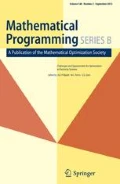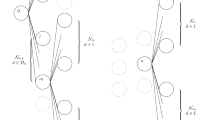Abstract
We consider multistage stochastic programs, in which decisions can adapt over time, (i.e., at each stage), in response to observation of one or more random variables (uncertain parameters). The case that the time at which each observation occurs is decision-dependent, known as stochastic programming with endogeneous observation of uncertainty, presents particular challenges in handling non-anticipativity. Although such stochastic programs can be tackled by using binary variables to model the time at which each endogenous uncertain parameter is observed, the consequent conditional non-anticipativity constraints form a very large class, with cardinality in the order of the square of the number of scenarios. However, depending on the properties of the set of scenarios considered, only very few of these constraints may be required for validity of the model. Here we characterize minimal sufficient sets of non-anticipativity constraints, and prove that their matroid structure enables sets of minimum cardinality to be found efficiently, under general conditions on the structure of the scenario set.



Similar content being viewed by others
References
Artstein, Z., Wets, R.J.-B.: Sensors and information in optimization under stochastic uncertainty. Math. Oper. Res. 28, 523–547 (1993)
Asamov, T., Ruszczynński, A.: Time-consistent approximations of risk-averse multistage stochastic optimization problems. Math. Progr. 1–35 (2014). doi:10.1007/s10107-014-0813-x
Bertsimas, D., Georghiou, A.: Design of near optimal decision rules in multistage adaptive mixed-integer optimization. Oper. Res. 1–18 (2015). doi:10.1287/opre.2015.1365
Birge, J.R., Louveaux, F.: Introduction to Stochastic Programming. Springer, Berlin (1997)
Boland, N., Dumitrescu, I., Froyland, G.: A multistage stochastic programming approach to open pit mine production scheduling with uncertain geology. Optim. Online (2008). http://www.optimization-online.org/DB_FILE/2008/10/2123.pdf
Bruni, M.E., Beraldi, P., Conforti, D.: A stochastic programming approach for operating theatre scheduling under uncertainty. IMA J. Manag. Math. 26(1), 99–119 (2014)
Colvin, M., Maravelias, C.T.: A stochastic programming approach for clinical trial planning in new drug development. Comput. Chem. Eng. 32, 2626–2642 (2008)
Colvin, M., Maravelias, C.T.: Scheduling of testing tasks and resource planning in new product development using stochastic programming. Comput. Chem. Eng. 33(5), 964–976 (2009)
Colvin, M., Maravelias, C.T.: Modeling methods and a branch and cut algorithm for pharmaceutical clinical trial planning using stochastic programming. Eur. J. Oper. Res. 203, 205–215 (2010)
Fragnière, E., Gondzio, J., Yang, X.: Operations risk management by optimally planning the qualified workforce capacity. Eur. J. Oper. Res. 202, 518–527 (2010)
Georghiou, A., Wiesemann, W., Kuhn, D.: Generalized decision rule approximations for stochastic programming via liftings. Math. Progr. 1–38 (2014). doi:10.1007/s10107-014-0789-6
Giles, L.: A Multi-stage Stochastic Model for Hydrogeological Optimisation, Masters Thesis, Department of Engineering Science, The University of Auckland (2009)
Goel, V., Grossmann, I.E.: A stochastic programming approach to planning of offshore gas field developments under uncertainty in reserves. Comput. Chem. Eng. 28(8), 1409–1429 (2004)
Goel, V., Grossmann, I.E.: A class of stochastic programs with decision dependent uncertainty. Math. Progr. Ser. B 108, 355–394 (2006)
Goel, V., Grossmann, I.E., El-Bakry, A.S., Mulkay, E.L.: A novel branch and bound algorithm for optimal development of gas fields under uncertainty in reserves. Comput. Chem. Eng. 30, 1076–1092 (2006)
Guigues, V., Sagastizábal, C.: Risk-averse feasible policies for large-scale multistage stochastic linear programs. Math. Program. 138, 167–198 (2013)
Gupta, V.: Modeling and Computational Strategies for Optimal Oilfield Development Planning Under Fiscal Rules and Endogenous Uncertainties, PhD Thesis, Carnegie Mellon University (2013)
Gupta, V., Grossmann, I.E.: Solution strategies for multistage stochastic programming with endogenous uncertainties. Comput. Chem. Eng. 35, 2235–2247 (2011)
Gupta, V., Grossmann, I.E.: A new decomposition algorithm for multistage stochastic programs with endogenous uncertainties. Comput. Chem. Eng. 62, 62–79 (2014)
Higle, J.L., Rayco, B., Sen, S.: Stochastic scenario decomposition for multistage stochastic programs. IMA J. Manag. Math. 21(1), 39–66 (2010)
Jonsbråten, T.W., Wets, R.J.-B., Woodruff, D.L.: A class of stochastic programs with decision dependent random elements. Ann. Oper. Res. 82, 83–106 (1998)
Kozmík, V., Morton, D.P.: Evaluating policies in risk-averse stochastic dual dynamic programming. Math. Progr. 1–26 (2014). doi:10.1007/s10107-014-0787-8
Philpott, A.B., de Matos, V.L.: Dynamic sampling algorithms for multi-stage stochastic programs with risk aversion. Eur. J. Oper. Res. 218, 470–483 (2012)
Ramazan, S., Dimitrakopoulos, R.: Production scheduling with uncertain supply: a new solution to the open pit mining problem. Optim. Eng 14, 361–380 (2013)
Ruszczyński, A.: Decomposition methods. In: Ruszczyński, A., Shapiro, A. (eds.) Stochastic Programming, Handbook in OR & MS, vol. 10. North-Holland Publishing Company, Amsterdam (2003)
Sahinidis, N.V.: Optimization under uncertainty: state-of-the-art and opportunities. Comput. Chem. Eng. 28(6–7), 971–983 (2004)
Schrijver, A.: Combinatorial Optimization: Polyhedra and Efficiency, Volume B. Springer, Berlin (2003)
Schultz, R.: Stochastic programming with integer variables. Math. Program. 97(12), 285–309 (2003)
Sen, S., Zhou, Z.: Multistage stochastic decomposition: a bridge between stochastic programming and approximate dynamic programming. SIAM J. Optim. 24(1), 127–153 (2014)
Shapiro, A.: On complexity of multistage stochastic programs. Oper. Res. Lett. 34, 1–8 (2006)
Shapiro, A.: Analysis of stochastic dual dynamic programming method. Eur. J. Oper. Res. 209(1), 63–72 (2011)
Shapiro, A., Dentcheva, D., Ruszczyski, A.P.: Lectures on Stochastic Programming: Modeling and Theory, Vol. 9. SIAM (2009)
Shapiro, A., Tekaya, W., da Costa, J.P., Soares, M.P.: Risk neutral and risk averse stochastic dual dynamic programming method. Eur. J. Oper. Res. 224(2), 375–391 (2013)
Solak, S., Clarke, J.-P.B., Johnson, E.L., Barnes, E.R.: Optimization of R&D project portfolios under endogenous uncertainty. Eur. J. Oper. Res. 207, 420–433 (2010)
Tarhan, B., Grossmann, I.E.: A multistage stochastic programming approach with strategies for uncertainty reduction in the synthesis of process networks with uncertain yields. Comput. Chem. Eng. 32, 766–788 (2008)
Tarhan, B., Grossmann, I.E., Goel, V.: Stochastic programming approach for the planning of offshore oil or gas field infrastructure under decision-dependent uncertainty. Ind. Eng. Chem. Res. 48(6), 3078–3097 (2009)
Tarhan, B., Grossmann, I.E., Goel, V.: Computational strategies for non-convex multistage MINLP models with decision-dependent uncertainty and gradual uncertainty resolution. Ann. Oper. Res. 203(1), 141–166 (2013)
Vayanos, P., Kuhn, D., Rustem, B.: Decision rules for information discovery in multi-stage stochastic programming. In: Proceedings of the 50th IEEE Conference on Decision and Control and European Control Conference (CDC–ECC), Orlando, FL, December 12-15, 2011, pp. 7368–7373
Acknowledgments
The authors are very grateful to BHP Billiton Ltd. and in particular to Merab Menabde, Peter Stone, and Mark Zuckerberg for their support of the mining-related research that inspired this work. We also thank Hamish Waterer and Laana Giles for useful discussions in the early stages of the research, and thank Hamish for his helpful suggestions and proof-reading of early versions of this paper. We are most grateful to Ignacio Grossmann for his advice and encouragement in completing the paper. This research would not have been possible without the support of the Australian Research Council, grant LP0561744. Finally, the efforts of two anonymous reviewers in improving the paper were greatly appreciated.
Author information
Authors and Affiliations
Corresponding author
Additional information
This research was supported by the Australian Research Council Linkage Project grant LP0561744 and by BHP Billiton Limited.
Appendix
Appendix
This appendix provides the proofs of Propositions 1 and 2.
Proof
(Proof of Proposition 1) Let \(\{r,s\}\in \mathcal{{T}}\), let \(\sigma \in \{r,s\}\) be chosen so that (8) holds, and define \(\bar{\sigma }\) so that \(\{\sigma ,\bar{\sigma }\} = \{r,s\}\). Thus (8) ensures that, for any given \(i\in \mathcal{{I}}\),
is satisfied. To show (6) holds, we must show
is also satisfied. We proceed by induction on t. For the case \(t=1\), (7) ensures \(\beta ^\sigma _{i,1} = 0\) so by (9) we have \(\beta ^s_{i,2} = \beta ^r_{i,2}\), and (10) must hold for \(t=1\). Make the inductive assumption that (10) holds for some \(t \in \{1,\dots ,T-2\}\). Now suppose that \(\sum _{j\in \mathcal{{D}}(r,s)} \beta ^{\bar{\sigma }}_{j,t+1} = 0\). Then by (2), \(\sum _{j\in \mathcal{{D}}(r,s)} \beta ^{\bar{\sigma }}_{j,t} = 0\), so by the inductive assumption, it must be that \(\beta ^s_{i,t+1} = \beta ^r_{i,t+1}\). Hence \(\sum _{j\in \mathcal{{D}}(r,s)} \beta ^{\sigma }_{j,t+1} = 0\) and so by (9) it must be that \(\beta ^s_{i,t+2} = \beta ^r_{i,t+2}\) as required; (10) holds for \(t+1\). \(\square \)
Proof
(Proof of Proposition 2) We prove that \({\mathcal {C}}\) is a generator by showing that for every \(e=\{r,s\}\in {\mathcal {T}}{\setminus }{\mathcal {C}}\) there is a dsc-path for e in \({\mathcal {C}}\). We proceed by induction on \(d(\theta ^r,\theta ^s)\). For \(d(\theta ^r,\theta ^s)=1\) the statement is vacuously true because there is no edge \(e=\{r,s\}\in {\mathcal {T}}{\setminus }{\mathcal {C}}\) with \(d(\theta ^r,\theta ^s)=1\). For \(d(\theta ^r,\theta ^s)\geqslant 2\), pick \(i\in {\mathcal {I}}\) with \(\theta ^r_i\ne \theta ^s_i\), let j and \(j'\) be the indices with \(\theta ^r_i=h^i_{j}\) and \(\theta ^s_i=h^i_{j'}\), and define \(s'\) by \(\theta ^{s'}_k=\theta ^{s'}_k\) for \(k\ne i\) and
Then \(d(\theta ^r,\,\theta ^{s'})=d(\theta ^r,\,\theta ^{s})-1\) and \(d(\theta ^{s'},\theta ^{s})=1\), i.e., \(\{s',s\}\in {\mathcal {C}}\). By induction, there is a dsc-path P for \(e'=\{r,s'\}\) in \({\mathcal {C}}\) with \({\mathcal {D}}(e'')\subseteq {\mathcal {D}}(e')\subseteq {\mathcal {D}}(e)\), and together with the edge \(\{s',s\}\) we obtain the required dsc-path for e.
Minimality of \(\mathcal{{C}}\) is not difficult to establish. Consider \(e=\{r,s\}\in \mathcal{{C}}\): without loss of generality suppose \(\theta ^r = (h^1_k,\alpha _2,\dots ,\alpha _{\mu })\) (where \(\mu =|\mathcal{{I}}|\)) and \(\theta ^s = (h^1_{k+1},\alpha _2,\dots ,\alpha _{\mu })\) for some \((\alpha _2,\dots ,\alpha _{\mu })\in \times \varTheta _{\mathcal{{I}}{\setminus }\{1\}}\) and some \(k\in \{1,\dots ,n_1-1\}\). Then \(\mathcal{{D}}(e) = \{1\}\) and any dsc-path for e in \(\mathcal{{C}}\) must have the form \(r=v_0, v_1,\dots ,v_m=s\) with \(e_j = \{v_{j-1},v_{j}\}\in \mathcal{{C}}\) and \(\mathcal{{D}}(e_j) = \{1\}\) for \(j=1,\dots ,m\). Thus it must be that \(\theta ^{v_j} = (h^1_{i_j},\alpha _2,\dots ,\alpha _{\mu })\) for \(h^1_{i_j}\in \varTheta _1\) and \(|i_j - i_{j+1}| = 1\), for all j. So \(i_0 = k\), \(i_{m} = k+1\), \(i_j\in \{1,\dots ,n_1\}\) for all \(j=0,\dots m\) and \(|i_j - i_{j-1}| = 1\), for all \(j=1,\dots ,m\). Since the path can be assumed to be simple, \(\{i_j\}_{j=0}^m\) are distinct. The unique solution to these requirements is to take \(m=1\). Thus \(\{r,s\}\) is necessary; if it is removed from \(\mathcal{{C}}\), the set will no longer be a generator. \(\square \)
Rights and permissions
About this article
Cite this article
Boland, N., Dumitrescu, I., Froyland, G. et al. Minimum cardinality non-anticipativity constraint sets for multistage stochastic programming. Math. Program. 157, 69–93 (2016). https://doi.org/10.1007/s10107-015-0970-6
Received:
Accepted:
Published:
Issue Date:
DOI: https://doi.org/10.1007/s10107-015-0970-6




